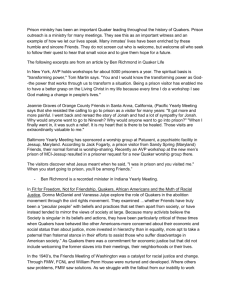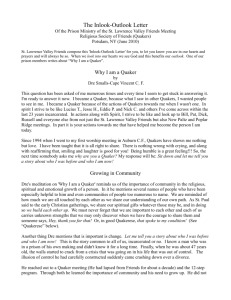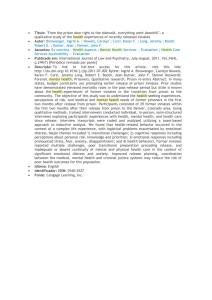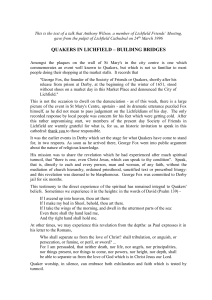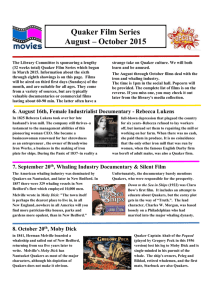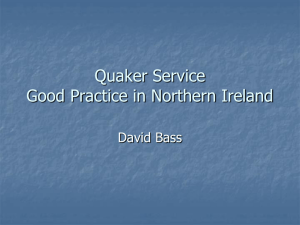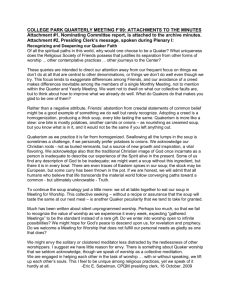Quakers and Punishment
advertisement
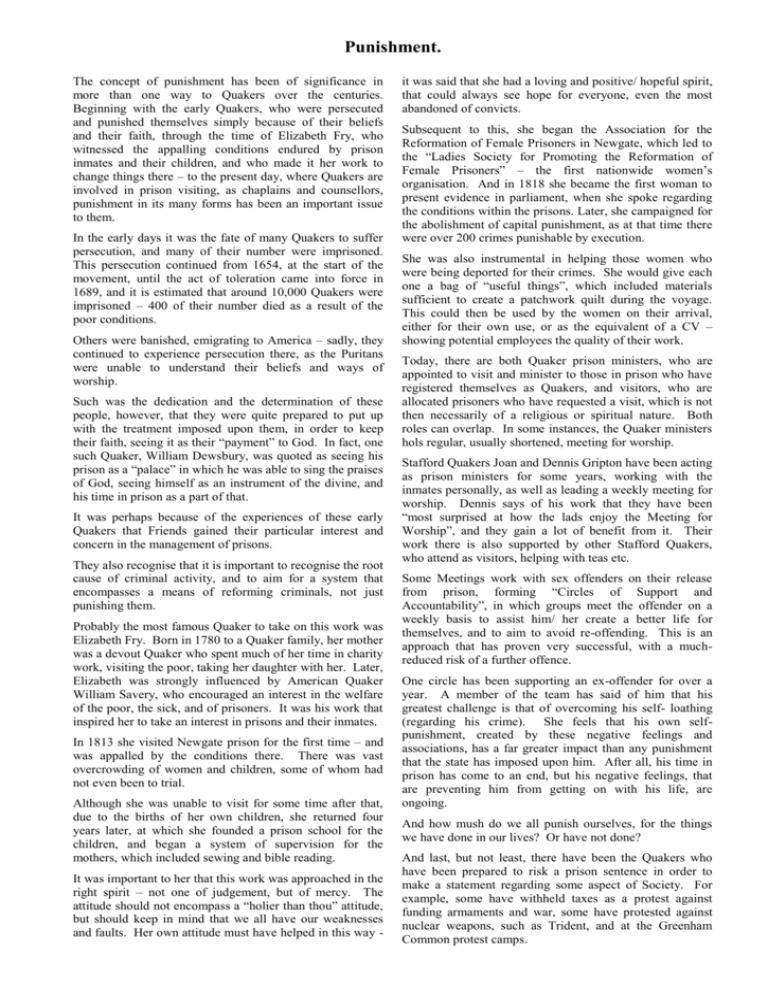
Punishment. The concept of punishment has been of significance in more than one way to Quakers over the centuries. Beginning with the early Quakers, who were persecuted and punished themselves simply because of their beliefs and their faith, through the time of Elizabeth Fry, who witnessed the appalling conditions endured by prison inmates and their children, and who made it her work to change things there – to the present day, where Quakers are involved in prison visiting, as chaplains and counsellors, punishment in its many forms has been an important issue to them. In the early days it was the fate of many Quakers to suffer persecution, and many of their number were imprisoned. This persecution continued from 1654, at the start of the movement, until the act of toleration came into force in 1689, and it is estimated that around 10,000 Quakers were imprisoned – 400 of their number died as a result of the poor conditions. Others were banished, emigrating to America – sadly, they continued to experience persecution there, as the Puritans were unable to understand their beliefs and ways of worship. Such was the dedication and the determination of these people, however, that they were quite prepared to put up with the treatment imposed upon them, in order to keep their faith, seeing it as their “payment” to God. In fact, one such Quaker, William Dewsbury, was quoted as seeing his prison as a “palace” in which he was able to sing the praises of God, seeing himself as an instrument of the divine, and his time in prison as a part of that. It was perhaps because of the experiences of these early Quakers that Friends gained their particular interest and concern in the management of prisons. They also recognise that it is important to recognise the root cause of criminal activity, and to aim for a system that encompasses a means of reforming criminals, not just punishing them. Probably the most famous Quaker to take on this work was Elizabeth Fry. Born in 1780 to a Quaker family, her mother was a devout Quaker who spent much of her time in charity work, visiting the poor, taking her daughter with her. Later, Elizabeth was strongly influenced by American Quaker William Savery, who encouraged an interest in the welfare of the poor, the sick, and of prisoners. It was his work that inspired her to take an interest in prisons and their inmates. In 1813 she visited Newgate prison for the first time – and was appalled by the conditions there. There was vast overcrowding of women and children, some of whom had not even been to trial. Although she was unable to visit for some time after that, due to the births of her own children, she returned four years later, at which she founded a prison school for the children, and began a system of supervision for the mothers, which included sewing and bible reading. It was important to her that this work was approached in the right spirit – not one of judgement, but of mercy. The attitude should not encompass a “holier than thou” attitude, but should keep in mind that we all have our weaknesses and faults. Her own attitude must have helped in this way - it was said that she had a loving and positive/ hopeful spirit, that could always see hope for everyone, even the most abandoned of convicts. Subsequent to this, she began the Association for the Reformation of Female Prisoners in Newgate, which led to the “Ladies Society for Promoting the Reformation of Female Prisoners” – the first nationwide women’s organisation. And in 1818 she became the first woman to present evidence in parliament, when she spoke regarding the conditions within the prisons. Later, she campaigned for the abolishment of capital punishment, as at that time there were over 200 crimes punishable by execution. She was also instrumental in helping those women who were being deported for their crimes. She would give each one a bag of “useful things”, which included materials sufficient to create a patchwork quilt during the voyage. This could then be used by the women on their arrival, either for their own use, or as the equivalent of a CV – showing potential employees the quality of their work. Today, there are both Quaker prison ministers, who are appointed to visit and minister to those in prison who have registered themselves as Quakers, and visitors, who are allocated prisoners who have requested a visit, which is not then necessarily of a religious or spiritual nature. Both roles can overlap. In some instances, the Quaker ministers hols regular, usually shortened, meeting for worship. Stafford Quakers Joan and Dennis Gripton have been acting as prison ministers for some years, working with the inmates personally, as well as leading a weekly meeting for worship. Dennis says of his work that they have been “most surprised at how the lads enjoy the Meeting for Worship”, and they gain a lot of benefit from it. Their work there is also supported by other Stafford Quakers, who attend as visitors, helping with teas etc. Some Meetings work with sex offenders on their release from prison, forming “Circles of Support and Accountability”, in which groups meet the offender on a weekly basis to assist him/ her create a better life for themselves, and to aim to avoid re-offending. This is an approach that has proven very successful, with a muchreduced risk of a further offence. One circle has been supporting an ex-offender for over a year. A member of the team has said of him that his greatest challenge is that of overcoming his self- loathing (regarding his crime). She feels that his own selfpunishment, created by these negative feelings and associations, has a far greater impact than any punishment that the state has imposed upon him. After all, his time in prison has come to an end, but his negative feelings, that are preventing him from getting on with his life, are ongoing. And how mush do we all punish ourselves, for the things we have done in our lives? Or have not done? And last, but not least, there have been the Quakers who have been prepared to risk a prison sentence in order to make a statement regarding some aspect of Society. For example, some have withheld taxes as a protest against funding armaments and war, some have protested against nuclear weapons, such as Trident, and at the Greenham Common protest camps.
